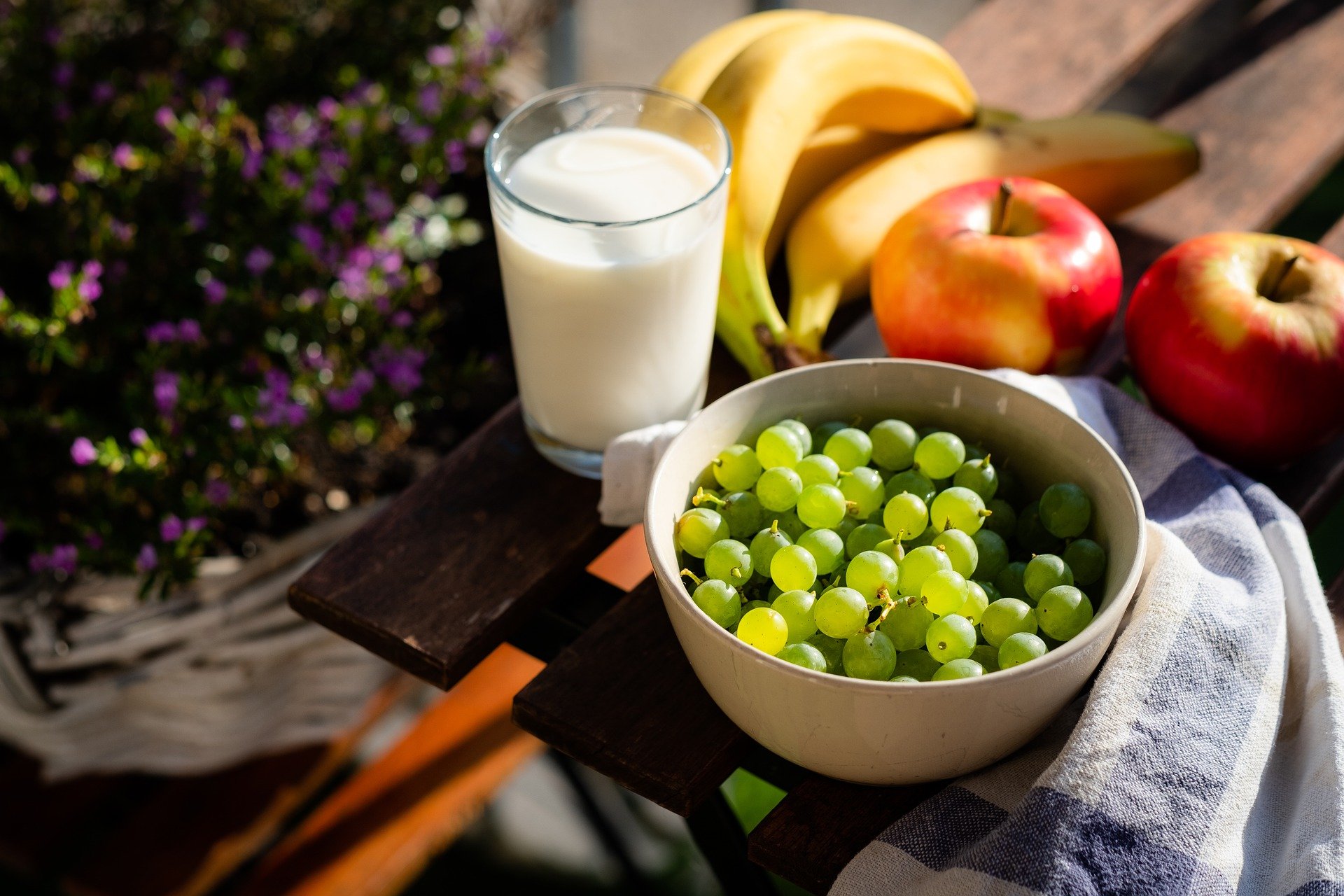5 Best Plant-based Milk Alternatives
Are you looking to go dairy-free? Plant-based milk alternatives are gradually saturating the market as milk substitutes. With so much variety, let’s talk about the 5 best plant-based milk alternatives.
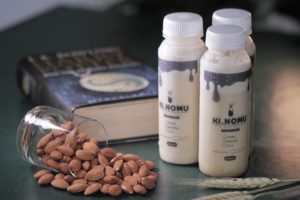
With changing attitudes about health, people are opting for plant-based milk options now more than ever. Although it’s not a new phenomenon, it’s only in the past decade or so that these alternatives have gotten so popular that there are dedicated isles for these products.
This is also true that not all milk is created equal. So to pick the best alternative for yourself and your family, you need to dig a little deeper.
Is Milk Bad For You?
For ages, we have been told that cow’s milk is a treasure of nutrients. While that is true to some extent, it’s hard to ignore all the red flags.
Milk is rich in protein, fat, calcium, phosphorus, and B vitamins. So at first glance, anyone would think that it’s a safe and healthy food. However, over the years, several studies and reviews have revealed that milk may be linked with an increase in the risk of certain diseases.
Moreover, there are many people who simply cannot drink milk because of certain conditions. For instance, those who are lactose intolerant can have serious gastric issues when they consume milk. Their bodies cannot break lactose, which is a sugar found in dairy.
Similarly, many children have milk allergies, which can lead to problems like diarrhea, nausea, rashes, and even anaphylaxis. Although, typically, this kind of allergy ends as they reach the end of their teens, still that leaves a part of the population who simply cannot consume milk.
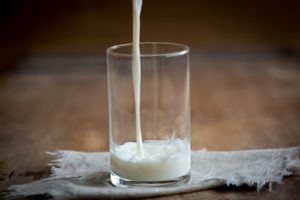
Such individuals have to resort to substitutes for milk for anything that uses traditional dairy products, like coffee, cereals, shakes, and desserts.
According to the American Journal of Clinical Nutrition, the excess calcium in milk can increase the risk of prostate cancer.
Dr. Michael Greger of NutritonFacts.org also explains in this video how milk and certain dairy products can lead to an excess of hormones. Almost all animal products do contain some types of hormones, but milk may be extra rich in estrogen.
Another important dairy substance to mention is casein, which is a protein that boosts muscle growth. However, it also has side effects, most notably linked with cancer and autism. Dr. T. Colin Campbell also declared casein as a carcinogen in his famous China Study.
Is Plant-based Milk Healthy?
Plant-based milk alternatives don’t pose the health risks that cow milk does. For starters, they don’t contain casein, which, as you know, has the potential to increase the risk of certain cancers. Secondly, plant-based sources of milk don’t amplify hormones in your body.
Moreover, it’s suitable for people who are lactose intolerant or have milk allergies.
Plant-based milk isn’t as rich in protein as cow milk. However, that’s not a big issue as they are plenty of other plant-based protein sources one can use to meet their daily protein take requirements.
Some plant-based milk brands also fortify their products with vitamin B12 or vitamin D. Many vegans are deficient in vitamin B12, which is a vitamin that’s only found in animal products. So these healthy milk substitutes don’t just protect you from the health hazards of dairy, but also help meet other nutritional requirements.
Then there’s also the environmental benefit as the production of vegan milk has a lower impact on the environment. According to a University of Oxford study, the production of one glass of dairy milk results in three times the greenhouse gases as that of any non-dairy plant-based milk.
All these health and environmental benefits come together to make plant-based milk alternatives a more viable, healthy option.
5 Best Plant-based Milk Alternatives
As this Journal of Food Science and Technology article points out, plant-based milk substitutes are emerging as truly sustainable and promising beverages. However, once you hit the market, you’d be surprised by just how much variety there is, which can be confusing at times.
The potential in this market is massive, given that people are making healthier choices. This has allowed many companies to jump in. Nevertheless, here are the five healthiest plant-based milk:
Soy Milk
- Calories: 90 kcal per cup (240 ml)
- Protein: 9 g
- Fat: 4.5 g
- Carbohydrates: 4 g
Soy milk hardly needs an introduction, as it has long been a popular staple in coffee shops, cafes, and bakeries. It’s made from soybeans essentially and at times just with the soy protein isolate.
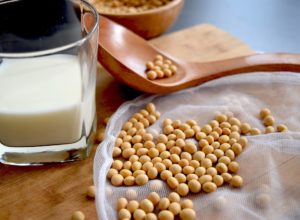
Soy milk has a very distinct, creamy flavor, which is why it’s great plant-based milk for coffee. It’s also very popular in Southeast Asia, where people have been drinking it in place of regular milk for ages.
If you’re looking for the closest thing to real cow milk, soy-based milk is what you want. Nutritionally, it’s very similar to dairy milk, offering you plentiful amounts of protein. One great thing about the protein from soy is that it’s a complete protein and that too without any health risks typically associated with animal protein.
Soy milk, as opposed to cow milk, doesn’t contain saturated fat or cholesterol. This also makes it heart-healthy and an effective alternative for patients with heart disease.
It cannot be fortified with vitamin D for legal reasons. However, you can easily find vitamin B12 fortified soy milk.
Even though it’s super healthy, it’s not suitable for those with a soy allergy.
Here are the best soy milk products:
Almond Milk
- Calories: 35 kcal per cup (240 ml)
- Protein: 1 g
- Fat: 2.5 g
- Carbohydrates: 2 g
Almond milk really has taken America by storm. It’s the go-to for many people looking for healthier milk alternatives. Made from almonds or almond butter, this milk has a nutty flavor. It’s also super light, so those who find cow milk heavy and bloating would like this substitute.
Almond milk is also ideal for those who want to keep their calorie intake down. As compared with cow milk, a glass of almond milk has half the calories and even lesser fat. This is why it’s also popular for use in desserts, as it can help reduce the overall calories of the dish.
While it contains many of the nutrients that dairy milk has, a notable vitamin is vitamin E. Vitamin E is known for its benefits for the skin.
All the benefits that you can get from almonds, you can get from almond milk. However, almond milk doesn’t contain as much fiber, fats, and protein as whole almonds. Nevertheless, it makes a suitable alternative to milk for everyday use as well as for those recipes that rely on milk.
As for the taste, almond milk has a nutty, mild, and sometimes sweet taste. Most brands don’t really add any sugars, so don’t be wary of the slight sweetness. It’s just the natural sugars.
Since this kind of milk is mostly water, it’s best to go for a product that has more concentration of almonds. Therefore, it will pack in even more nutrients.
Here are some almond milk products to try:
- Califia Farms Unsweetened Almond Milk
- 365 Organic Unsweetened Chocolate
- Mooala Plant-based Almond Milk
Oat Milk
- Calories: 140 to 170 kcal per cup (240 ml)
- Protein: 2.5 to 5 g
- Fat: 4.5 g
- Carbohydrates: 19 to 29 g
One of the best milk alternatives for cereal and coffee is oat milk. It’s nothing but a blend of rolled oats with water. You can even make your own oat milk at home in a blender.
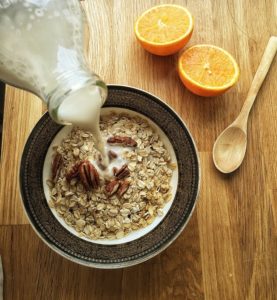
The oat milk you will find on the market shelves will taste a little better than the homemade one. That’s because they add other ingredients to elevate the taste. If you like the mild taste of oats in your oatmeal, you’ll likely also appreciate oat milk’s taste and texture.
Oats, as you know, are high in fiber, so oat milk is also rich in fiber. In fact, the beta-glucan, which is a type of fiber, helps bring down cholesterol, as evidence by this American Journal of Clinical Nutrition analysis.
So those who have cholesterol issues and have a high risk of heart disease or are already diagnosed with it should go for oat milk for their breakfast and beverages.
It’s also really good for people with diabetes, as oats can help regulate blood sugar levels.
Even though texture-wise, oat milk isn’t really heavy, it does make you feel fuller. If you have your morning cereal with this, you will likely feel fuller for a longer period. This is thanks in part to all that extra fiber content that regular milk cannot deliver.
If you’re looking to make your own, here’s a recipe you can follow. In the market or online, go for these brands:
- Oatsome Organic Oat Milk
- Pacific Foods Organic Oat Beverage (Reduced Sugar)
- Califia Farms Oat Barista Blend (Gluten-Free)
Rice Milk
- Calories: 140 kcal per cup (240 ml)
- Protein: 1 g
- Fat: 3 g
- Carbohydrates: 38 g
For those with dairy, soy, or nut allergies, rice milk is the best alternative. It can be made from both white and brown rice. This one also has a watery consistency but still makes a good choice adding to recipes.
The great thing about rice milk is that it’s naturally sweet. If you find the mild taste of the other plant-based milk options a bit bland, you’ll appreciate the sweet notes in this product.
Rice milk is rich in carbs because, well, rice has a higher content of carbs. Protein and fat are present in relatively less amount. Since it’s higher in carbs, it may not be a suitable option for people with diabetes or those watching their weight.
Although there are concerns about arsenic in rice, it’s generally safe to consume rice milk in moderate quantities. It’s also a good source of B vitamins.
Here are top choices for rice milk:
- Rice Dream Organic Rice Drink
- Kirkland Signature Organic Rice Milk
- Pacific Foods Rice Milk Barista Series
Hemp Milk
- Calories: 80 kcal per cup (240 ml)
- Protein: 3 g
- Fat: 8 g
- Carbohydrates: 1 g
If you asked what is the healthiest plant-based milk, the answer would most likely be hemp milk. Hemp milk comes from the seeds of the hemp plant, also known as Cannabis Sativa.
Yes, it’s from the same family of plants as marijuana. However, you don’t have to worry about any psychoactive effects as the hemp plant only contains a trace amount of THC.
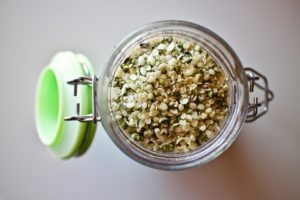
It does contain nearly the same amount of fat as cow milk, making it appropriate for those looking for something high in fat. That’s probably also the reason why hemp milk tastes so much better in coffee and smoothies.
The protein, although less in quantity as compared with dairy milk, is a complete protein. It can easily help you get the required amount of protein in a day. More importantly, hemp milk contains omega-3 fatty acids, which reduce triglycerides, lower high blood pressure, and improve brain function.
For those trying to lose weight, this plant-based milk is a good choice because it contains very few carbs.
In terms of taste, hemp milk has a nutty, earthy taste with mild to no sweetness. It’s also creamier milk than other plant-based milk options.
Here are some popular hemp milk products:
- Hemp Yeah! Unsweetened Original Hempmilk
- Califia Farms Hemp Barista Blend
- Living Harvest Unsweetened Original Hemp Milk
Wrap Up
The 5 best plant-based milk alternatives can provide you with similar nutrition as dairy milk but also keep you safe from the health risks. Cow milk is nutritionally rich, but as research shows, consuming a lot of it could raise concerns for cancer. So it’s best to stick to plant-based milk substitutes instead.
You can do pretty much everything with these that you’d do with regular milk. You can bake cakes, enjoy a bowl of cheerios, or make yourself a creamy cup of coffee. Oh, and you also help save the planet by reducing emissions.


